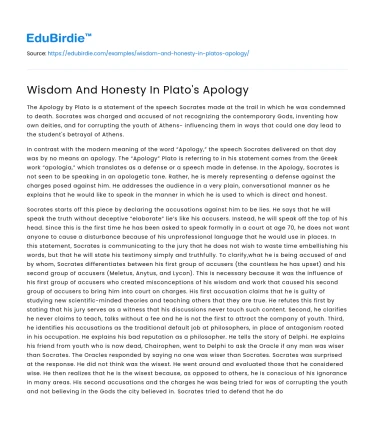The Apology by Plato is a statement of the speech Socrates made at the trail in which he was condemned to death. Socrates was charged and accused of not recognizing the contemporary Gods, inventing how own deities, and for corrupting the youth of Athens- influencing them in ways that could one day lead to the student's betrayal of Athens.
In contrast with the modern meaning of the word “Apology,” the speech Socrates delivered on that day was by no means an apology. The “Apology” Plato is referring to in his statement comes from the Greek work “apologia,” which translates as a defense or a speech made in defense. In the Apology, Socrates is not seen to be speaking in an apologetic tone. Rather, he is merely representing a defense against the charges posed against him. He addresses the audience in a very plain, conversational manner as he explains that he would like to speak in the manner in which he is used to which is direct and honest.
Save your time!
We can take care of your essay
- Proper editing and formatting
- Free revision, title page, and bibliography
- Flexible prices and money-back guarantee
Socrates starts off this piece by declaring the accusations against him to be lies. He says that he will speak the truth without deceptive “elaborate” lie’s like his accusers. Instead, he will speak off the top of his head. Since this is the first time he has been asked to speak formally in a court at age 70, he does not want anyone to cause a disturbance because of his unprofessional language that he would use in places. In this statement, Socrates is communicating to the jury that he does not wish to waste time embellishing his words, but that he will state his testimony simply and truthfully. To clarify,what he is being accused of and by whom, Socrates differentiates between his first group of accusers (the countless he has upset) and his second group of accusers (Meletus, Anytus, and Lycon). This is necessary because it was the influence of his first group of accusers who created misconceptions of his wisdom and work that caused his second group of accusers to bring him into court on charges. His first accusation claims that he is guilty of studying new scientific-minded theories and teaching others that they are true. He refutes this first by stating that his jury serves as a witness that his discussions never touch such content. Second, he clarifies he never claims to teach, talks without a fee and he is not the first to attract the company of youth. Third, he identifies his accusations as the traditional default job at philosophers, in place of antagonism rooted in his occupation. He explains his bad reputation as a philosopher. He tells the story of Delphi. He explains his friend from youth who is now dead, Chairophen, went to Delphi to ask the Oracle if any man was wiser than Socrates. The Oracles responded by saying no one was wiser than Socrates. Socrates was surprised at the response. He did not think was the wisest. He went around and evaluated those that he considered wise. He then realizes that he is the wisest because, as opposed to others, he is conscious of his ignorance in many areas. His second accusations and the charges he was being tried for was of corrupting the youth and not believing in the Gods the city believed in. Socrates tried to defend that he does believe in God despite being a questioning man. Additionally, Socrates wanted to make sure people understand that he did not teach for a fee and that his new accusations were false as well as the old ones.
During Socrates' defense, he talks to the jury about the different punishments they could give him. He mentions paying a fee, but that would be meaningless because of his poverty status. He acknowledges Meletus suggestion of death penalty by saying, “what should I fear? That I should suffer the penalty Meletus has assessed against me, of which I say I do not know whether it is good or bad?” Socrates is saying that he is not afraid of dying. When it was put to vote, he was ultimately sentenced to death. After this sentencing, he explains why he is still winning. Socrates told the jury “... either the dead are nothing and have no perception of anything, or it is, as we are told, a change and a relocation for the soul from here to another place.” This means he is either put to a peaceful rest for eternity or he is relocated to continue teaching philosophy to another realm. Before he died, we warned the jurymen who sentenced him to death that they hurt themselves by silencing him. He warns them that he will not be the last one to question them of their knowledge and lives.






 Stuck on your essay?
Stuck on your essay?

